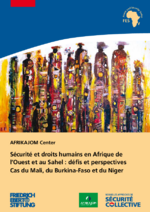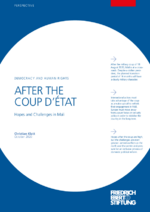Mali
Mali was long regarded as a model democracy in West Africa. However, the multidimensional crisis since 2012/2013 has revealed the country's instability. The experience of the occupation of northern Mali by insurgent and jihadist groups in 2012/2013, which was accompanied by the most serious human rights violations, continues to preoccupy Malian society. With the implementation of a peace treaty signed in Bamako in May and June 2015, Mali attempted to regain stability and address the causes of the multidimensional crisis. Following its cancellation in spring 2024, the implementation of political and institutional reforms remains crucial to the peace and reconciliation process. After a military coup in March 2012, Mali quickly returned to constitutional order with presidential and parliamentary elections. However, the government elected in 2013 and re-elected in 2018 was unable to fulfil the hopes placed in it and was deposed by a military coup in August 2020 following protests by civil society. Since then, Mali has been in a transitional phase. Despite international interventions, the establishment of a UN peacekeeping mission and its withdrawal, parts of the country continue to be characterised by insecurity, as evidenced by fighting between armed groups, criminal organisations and repeated terrorist attacks. To solve the regional and national challenges, Mali is seeking to emancipate itself from old alliances and forge new ones with its immediate neighbours.
In Mali, which is one of the 20 poorest countries in the world, promoting economic development, combating unemployment and ensuring food security are the key challenges alongside reforming the education and justice systems and fighting corruption and mismanagement.
The Friedrich-Ebert-Stiftung (FES), which has been active in Mali since 1968, endeavours to support its partners from politics, trade unions, civil society and the media in tackling the numerous challenges facing the country. The FES country office in Bamako is committed to strengthening democratic principles and political participation, promoting freedom of expression and the press as well as human rights. In addition, the FES in Mali works on the issues of fair labour, economic and security policy, state reform and good governance. Gender equality is a cross-cutting issue in all areas.
Find out more about our work in Mali on the website of the country project.
Publications
Barry, Adama
COVID-19 et emploi au Mali
Bamako, 2021
Download (PDF) (400 KB, PDF-File)
Dakono, Baba
La crise au Mali est-elle insurmontable?
Download (PDF) (360 KB, PDF-File)
Sécurité et droits humains en Afrique de l'Ouest et au Sahel
Dakar-Fann, 2021
Download (PDF) (420 KB, PDF-File)
Klatt, Christian
After the coup d'état
Berlin, 2020
Download (PDF) (85 KB, PDF-File)




